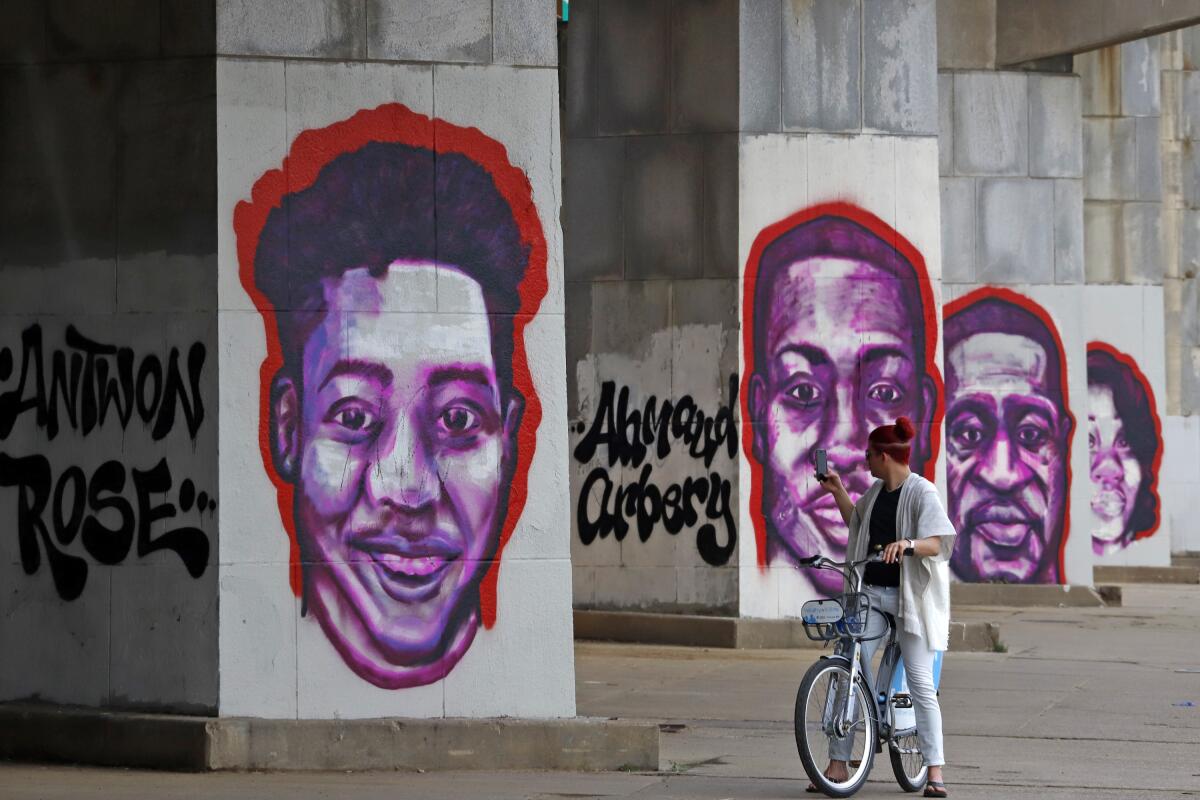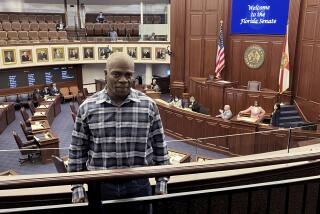Arbery case shows the worst chapter of Georgia’s history is current events as well

- Share via
It only makes sense that the three white Georgia men accused of murdering Ahmaud Arbery would turn to a Civil War-era law as their defense. The video footage of them hunting and killing the 25-year-old Black man looks like a clip from a slave patrol training video.
For those who don’t know what I’m talking about, slave patrols were militia members whose job was to apprehend runaway slaves and prevent slave revolts. Oftentimes that led to violence, including lynchings.
As Black people gained freedom, lawmakers in the South passed loitering laws to help the slave patrol — and subsequently police departments — continue to terrorize Black people with the government’s blessings. One such example was Georgia’s “citizen’s arrest” law of 1863, which gave citizens the right to arrest someone they believe committed a crime. Since Black Americans were not considered citizens back then, Georgia basically took time off from losing the Civil War to give armed racist white folks permission to arrest Black people for being in the wrong neighborhood.
Incredibly, this is the law to which the defense teams for Gregory McMichael, 67; his 35-year-old son, Travis McMichael; and their neighbor William Bryan, 52, are turning to get their clients out of jail after prosecutors said the three chased, entrapped and killed Arbery back in February 2020 near Brunswick, Ga. Jury selection began Monday.
The three are claiming they suspected Arbery of committing a crime and that his murder was in self-defense, although Arbery was unarmed and out for a jog. They were the ones with guns, chasing him in their pickup trucks. They also didn’t bother dialing 911 beforehand.
Richard Dial, an assistant special agent in charge for the Georgia Bureau of Investigation and the lead agent in the case, said that Travis McMichael, the man who shot Arbery, had a Confederate flag sticker on the toolbox of his truck, used racial slurs in text messages, and said in an Instagram message that he wanted someone to have “blown that N-word’s head off,” though Dial wasn’t sure who McMichael wanted dead.
I guess we could put our heads in the sand and entertain the idea that the three were attempting to make a citizen’s arrest, or we can be honest about the situation and acknowledge that Arbery appears to have been either lynched by vigilantes or hunted by a modern-day slave patrol. It feels like one and the same.
The most unnerving part about all of this is they would have escaped attention had the video Bryan took on his cellphone not leaked and gone viral. Local law enforcement, of which Gregory McMichael is a retired member, said the three did nothing wrong and let them go. This despite Dial’s saying Gregory McMichael can be heard on police body camera footage saying he didn’t know whether Arbery had committed a crime.
“He had a gut feeling that Mr. Arbery may have been responsible for thefts that were in the neighborhood previously,” Dial said. “He actually says ‘gut.’ His instincts told him that.”
It’s as if Georgia hadn’t changed one lick since 1863.
But then you look at the 2020 election results and remember that it has. Then you look at the calls for an audit and the voter suppression laws that followed and … who knows what to think. The “citizen’s arrest” law was repealed last year, which means that for 157 years a law rooted in pure racism provided legal cover for vigilantes to do exactly what the McMichaels and Bryan are accused of doing.
We had a chance to get this right, you know. Following the Civil War, there was a window, an opportunity for this country to finally try to be the things it said it was. But instead of working toward peace, the country settled for quiet as the federal government gave reparations to former slave owners — instead of those who had been enslaved — and allowed Confederate soldiers to become sheriffs and deputies.
This is why no matter how fast we run or how far we go, whenever a high-profile murder trial with racial overtones emerges, at some point the country finds itself right back at the feet of its greatest failure. We call the time after the Civil War “Reconstruction,” but as the circumstances surrounding the murder of Arbery show, it was more like “Reshuffling.”
More to Read
A cure for the common opinion
Get thought-provoking perspectives with our weekly newsletter.
You may occasionally receive promotional content from the Los Angeles Times.










